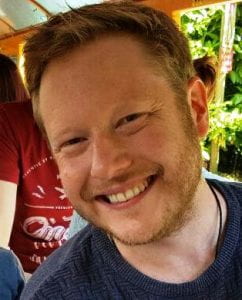Meet Dr Andy Flack, Lecturer in Modern and Environmental History.
Tell us about your journey into academia…
To be honest, I fell into my academic career. There was no particular plan that I opted to follow. Having completed my BA in History, I undertook an MA in Contemporary History before going to work in the Third Sector in London. I was lured to undertake doctoral study – An Animal History of Bristol Zoo – four years later not because I aspired to an academic career, but because I was relentlessly curious. I missed the university environment and the kind of learning that it fosters.
Indeed, I’ve loved learning from an early age. From childhood through my teenage years and into my adult life, I could usually be found with my nose buried deep in a work of history, or alternatively a work of natural history. From that point of view, it’s perhaps unsurprising that I’ve ended up working as an environmental historian; a field which combines history with the natural sciences, and which studies the ways in which people in the past have interacted with the natural world. I also need to note that I undertook all my degrees here, at the University of Bristol. There is certainly something about this place – and the way in which it teaches History – that has kept me ‘hooked’.
What’s your favourite thing about teaching on postgraduate taught programmes at Bristol?
I love teaching on postgraduate History programmes. MA students on our courses tend to be committed to learning about the past in active conversation with their peers, both staff and students. Indeed, we very much feel that our master’s students are valuable co-investigators as we collectively look to the past to see what we can unearth.
In particular, the MA History course allows students to undertake deep reading and research across historical periods, places, and topics. There are several specific areas where our University is especially strong. We have a strong team of historians of modern Britain, modern America, and slavery, as well as the largest grouping of environmental historians anywhere in the world, beyond a couple of institutions in North America. The MA course gives me an unequalled opportunity to teach my own specialism – modern environmental history – with my colleagues and in depth – to students who are committed to and excited by the past and the lessons we might draw from it that can help us to address some of the greatest crises of our times.
What’s your number one top tip for prospective postgraduate students?
My top tip for prospective postgraduates is to enter your studies with an open mind. Certainly, you’ll most likely have identified the kinds of histories you know you like via previous degrees, for example. The MA will give you the chance to dive deep into those histories. However, the most rewarding aspect of postgraduate study, in my view, is embracing the chance to study people, places, and approaches to the past that you might be deeply unfamiliar with. Take a ‘risk’. What about Medical History? Or Environmental History (of course…)? Take the road less travelled and you might find that your way of thinking about the world – in the past and present – is changed forever, opening an array of new opportunities in the process.


